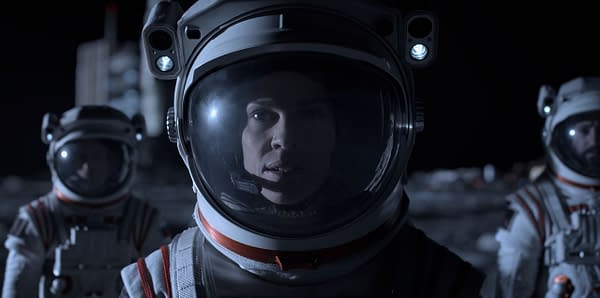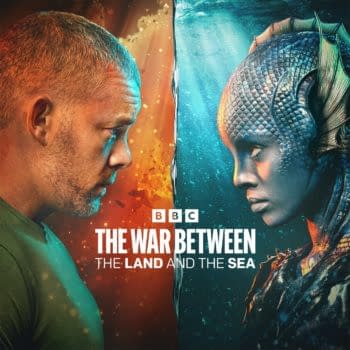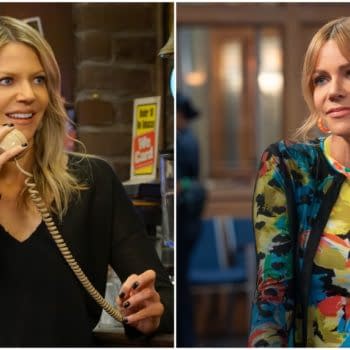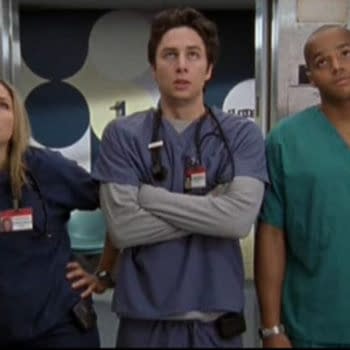Posted in: Amazon Studios, HBO, Hulu, Netflix, streaming, TV | Tagged: Ad Astra, astronauts, Away, bleeding cool, cable, hulu, movies, nasa, netflix, sad astronauts, space, streaming, television, The First, tv
Away, The First, Ad Astra & More: Why So Many Sad Astronauts?
Away, the new Netflix series starring Hilary Swank is the latest show about angst-ridden astronauts heading into space. Before that, there was 2018's The First, the Hulu series starring Sean Penn which was about a bunch of angsty astronauts training to go to Mars. These two shows are mainly soap operas about astronauts and the latest examples of the Sad Astronaut genre.

The Sad Astronaut genre is generally a straight story about astronauts and their mission to go to space. It's different from thrillers about astronauts who bring back alien invaders or become infected with a deadly alien virus and go on a murderous rampage. The Sad Astronaut genre is about how sad it is to be an astronaut, which runs counter to real-life where astronauts generally talk about how inspirational and transcendental it is to go to space and come back. Astronaut movies and TV shows tend to be about sad astronauts.
First Man has Ryan Gosling playing Neil Armstrong as an emotionally compartmentalized man stoically striving to be the first man on the moon even as the death of his young daughter looms large in his psyche, casting a shadow over his mission where he could die as well, having lost fellow astronaut friends in previous failed missions. Instead of the hope, joy, and patriotic optimism that astronauts and space missions represent, First Man makes Armstrong's mission to the moon a solemn, existential meditation on death and loss.
Ad Astra is about Brad Pitt playing an astronaut who brings his daddy issues with him to space. The movie is so dour and humorless it makes me laugh. Director James Gray seems to be incapable of making an intentionally funny movie, to the point where the self-seriousness of his movies become unintentionally funny. Some of his movies are very good, but no one can ever accuse any of them of being funny. This leads me to think that in an alternate universe, he's making the best and funniest comedies in the world, just not in ours. Here, Brad Pitt is an unhappy man who seems to infect wherever he goes with his unhappiness where anyone who opposes him on his mission to find his father tends to die. When he finds his father (Tommy Lee Jones), the older man has gone completely insane and ends up committing suicide by space. The movie seems to say over and over that going to space is a miserable business. Brad Pitt gets to fight moon pirates, and that's still miserable?
Why Do Female Astronauts Have to Suffer More?
Alfonso Cuaron's Gravity started the trend where the female astronaut has to go through the emotional wringer. In Gravity, Sandra Bullock has the unnecessary backstory of grieving a dead daughter. What, it's not enough that she's trapped in orbit and space is threatening to kill her? It's not enough that she has to struggle with how to stay alive?
In both Away and Proxima, Hilary Swank and Eva Green have to suffer guilt for leaving their daughters behind to go to space, but the mission is more important. It's as if the story punishes them for abandoning their daughters. In Lucy in the Sky, Natalie Portman suffers from some kind of nervous breakdown after coming back from space, becoming a bunny-boiler who stakes a fellow astronaut played by Jon Hamm. Why does it feel like Hollywood wants to punish female astronauts?
Do Astronauts Have to Be Miserable Now Because We Are, Too?
Hollywood screenwriters are wired to find conflict wherever possible, and it's easier to make astronauts miserable than have them be cheerful, optimistic, and competent people. If real-life astronauts were as sad and miserable as the ones in current movies and TV series, they'd never be allowed into outer space because their mental health issues would be deemed a liability that could endanger their colleagues and the mission. Why would depressed, miserable people even want to go into space? Where would they find the motivation?
Are screenwriters tapping into a general sense of pessimism (on top of their own) to write Sad Astronaut stories? They seem to reflect the general mood of the world more than that of real astronauts. Does the general public want Sad Astronaut stories? First Man got a critical slapping and The First was canceled after just one season.
The exception to the rule has been The Martian, where Matt Damon is trapped on Mars but decides to Science his way to salvation, refusing to give up, no matter how dire things get. The original novel by Andrew Weir is funnier, where the hero's narration shows what an irrepressible, wisecracking nerd he is, even when he screws up occasionally and nearly dies from it. The movie downplays the jokes and even shows the odd moment where Damon is overtaken by fear and despair before repressing it to carry on, and it all pays off for him in the end.
If there's one thing all these astronaut stories have in common, it's the characters' unstoppable competence. They just get on with solving every problem that comes along, and failure would have meant death. Out of all the sadness still comes some hope and optimism after all: that sheer competence and perseverance will always win in the end.
Away is now streaming on Netflix.














